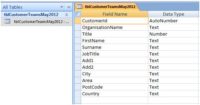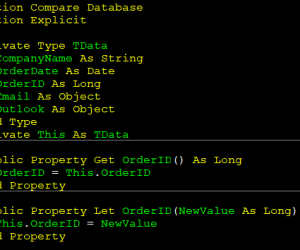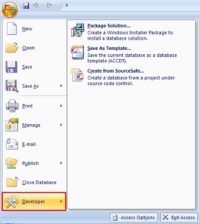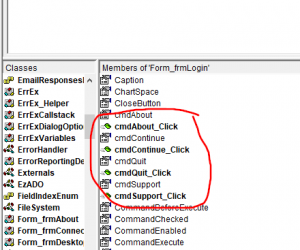Before we create the Make Table Query, you might like to create a new blank database file. This is so we have a separate database into which we can paste the new table from the query. In this exercise I have called it HistoricData.accdb. Here is the procedure to create a Make Table Query: Open…
#LateBind Constant
In standard code, we make use of #LateBind conditional compilation constant, which is typically defined via project’s Conditional Compilation Argument in the dialog: NOTE: The dialog can be found via Tools → <project name> Properties, which is located below the Options menu item. The menu item caption will be different as it includes the project…
Enable and Disable a Form Control using VBA
I was working on a design for an Order Management Database, and one of the tasks I dealt with involved dynamically Enabling or Disabling one of the form’s Command Buttons’ using VBA. This gave me the idea for the present Access tip. The command button was located on a Customer Details form which had an Orders…
Module level variables
It is common to create a big wall of declaration in a module such as this: Private strCompanyName As String Private dteOrderDate As Date Private lngOrderID As Long Private objEmail As Object Private objOutlook As Object While the code will compile and work fine, the discoverability and naming of the module level variables does become…
“Truthy” and “Falsy” Values
VBA is quite very loose in what it deems “truthy” and “falsy”. For example, this procedure can produce surprising result: If Me.MyBitField.Value = True Then ‘It is true Else ‘It is false End If At the first glance, it seems expected that if the bit field is set to 1, it would succeed. But in…
Pivoting a dynamic set
SQL Server does not allow for a dynamic set, which can be problematic if you need to pivot based on the data that comes from rows and you can have various values in the column. In general, you need a stored procedure and dynamic SQL in order to handle the dynamic pivots. This requires uses…
Access DateValue() function to SQL Server equivalent
What is the SQL Server equivalent to Access DateValue() function? Access SQL DateValue([Event Timestamp]) SQL Server Equivalent cast([Event Timestamp] as date) convert(date, [Event Timestamp])
Access NZ() function to SQL Server equivalent
What is the SQL Server equivalent to Access NZ() function? Access SQL NZ([Event Timestamp]) SQL Server Equivalent COALESCE([Event Timestamp],0) ISNULL([Event Timestamp],0) * do not confuse this with the Access isnull() function.
Access 2007: Access Developer Extensions
The Microsoft Office Access 2007 Developer Extensions make it easy to deploy and manage solutions built using Microsoft Access. The Access 2007 Developer Extensions provide packaging and deployment tools and licensing and distribution agreements to make it easier for developers to bring solutions to market. Whether you are working in a small business or a…
Prefer compile time errors over run time errors
In VBA, there are several features that allow us to do things that may not be checked at the compile time. In particular, it is possible to write several late-bound expressions which means that it can potentially contain run-time errors. One common misconception about late-binding is that it’s a matter of adding a reference and…






